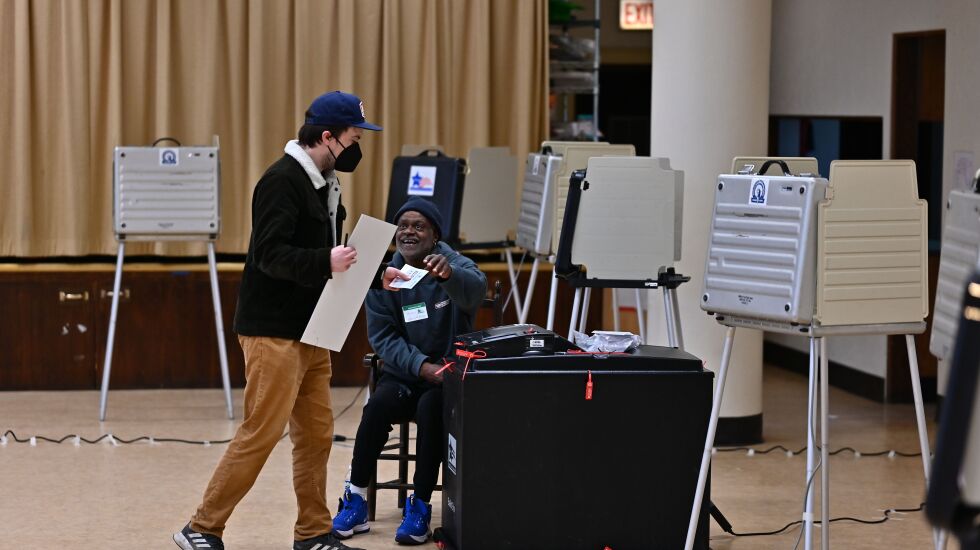
Big — often secret — election money wins too often, in Illinois and the nation.
Voters’ interests often take a back seat to hush-hush extravagant campaign donations, which can be used to disguise who is lavishing cash on candidates, as the Sun-Times’ Tina Sfondeles reported last week. The money also can be used to meddle in opposing party’s primary elections, or to take advantage of Illinois’ unique self-funding loophole to skirt campaign spending caps.
The result? The voices of ordinary residents often are muffled under torrents of political moolah. In public, politicians might say they support certain issues favored by voters, but no one can be sure if those politicians are instead swayed by deep-pocketed, unidentified donors with significantly different interests. Laws and policies that favor big money, not everyday people, end up ruling the day.
One bill won’t solve the problem of money-tainted politics. But a reform the state Legislature and Chicago City Council should adopt this year is small-donor matching — an idea this editorial board has previously championed — in which public money would be used to match each individual campaign donation below a certain amount. For example, the first $100 to $200 a voter donates could be matched with public funds, perhaps a three-to-one match, six-to-one or more.
Now, average people can be discouraged from donating money because the few bucks they can come up with as they live paycheck to paycheck feel almost meaningless as they watch enormous sums from anonymous sources flow into politicians’ war chests.
State Rep. Kelly Cassidy, D-Chicago, introduced a bill last year to create a small-donor matching system, but it was shunted off to the Rules Committee, where it has languished ever since. Cassidy, a member of the House Ethics & Elections Committee, told us she hopes to push through the idea this year, perhaps as part of an end-of-session omnibus election bill.
The city of Evanston in September adopted a small-donor matching system, but a proposal to adopt one in Chicago hasn’t yet passed in the City Council, even though Chicagoans in 2015 overwhelmingly approved an advisory referendum.
However, Ald. Matt Martin (47th) is heading a working group studying small-donor matching for City Council elections. Martin, who chairs the Committee on Ethics and Government Oversight, hopes to have a proposed ordinance this year, preferably in the next six months.
“At the city level, we have this tremendous opportunity to improve the way that people think of the process by which they select their representative,” he said.
Another reform that should be adopted is to require donors who contribute to super PACs to disclose where large amounts of that money came from. Rhode Island, California and Massachusetts have passed bills based on that concept.
The old axiom that sunshine is the best disinfectant — meaning that big political donations would be less corrupting if everyone knew where they came from — has taken a beating in court rulings, particularly Citizens United v. FEC in 2010. Elections now are skewed by money from an opaque assortment of PACs, super Pacs, 501(c)(4)s and other impenetrable sources.
There’s even the possibility that foreign interests could be pouring money into U.S. elections, which is illegal. Because of all the secrecy, who knows? So much for letting the sunlight in.
If a small-donor matching amount is big enough, politicians — lured by the extra cash — might actually set aside more time to meet constituents and listen to what they have to say.
Safeguards would have to be built in. Candidates would have to raise enough money on their own to qualify, and they would have to agree to spending caps, contribution limits and enhanced disclosure.
Protections would be needed against “straw donors,” in which a megabucks donor gets more bang for the buck by pretending individuals are donating the money. Accusations of such behavior are bedeviling New York City, which provides-eight to-one small donor matches. In November, the New York Times reported the FBI was investigating whether Mayor Eric Adams’ campaign had received campaign contributions from the Turkish government and Turkish nationals that were disguised as coming from U.S. donors, according to a search warrant.
Structuring elections so the side with the best ideas, instead of the most money, wins won’t be easy. But reforms are essential, if we want to make government at all levels be more responsive to the people.
Send letters to letters@suntimes.com
This editorial is published as part of “The Democracy Solutions Project,” a partnership among the Chicago Sun-Times, WBEZ and the University of Chicago’s Center for Effective Government to examine critical issues of democracy as the 2024 election approaches.







